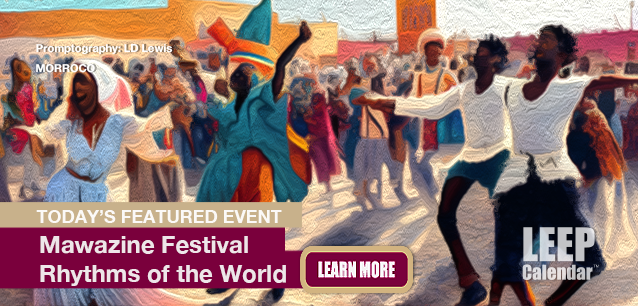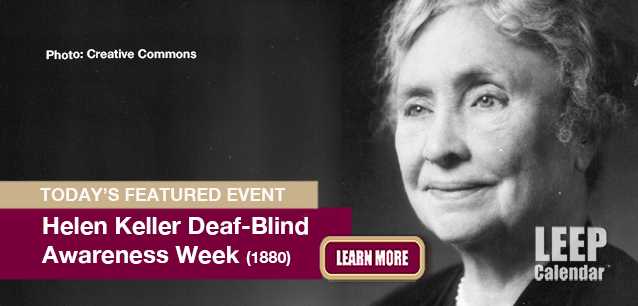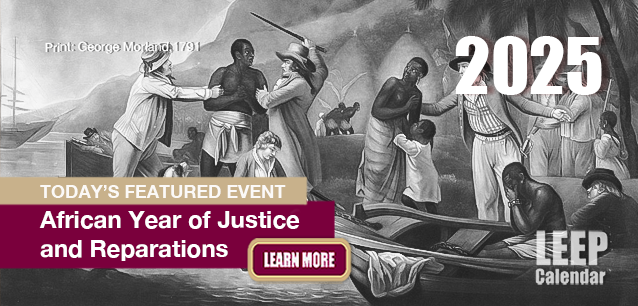 AD
AD
Country
- Africa
- Alcohol, Tobacco & Drugs
- Animals, Fish, Insects & Birds
- Anniversaries
- Australia
- Books
- Brazil & S.America
- Buddhism
Category
- Afghanistan, AF
- Aland Island, AX
- Albania, AL
- Algeria, DZ
- American, Samoa, AS
- Andarra, AD
- Angola, AO
- Anguilla, Al
Event Type
- Daily
- Weekly
- Annual
- Recurring
Duration
- All
- 1 Day
- 2 Day
- 3 Day
- 4 Day
- 5 Day
- 6 Day
Event Type
- Daily
- weekly
- Annual
- Recurring
Event Type
- Daily
- weekly
- Annual
- Recurring
Today is: June 25
Catfish Day, Ntl.
Folklife Festival, Smithsonian (US-DC)
Independence Day (MZ)(1975)
Moon—New
National Day (SI)(1991)
Seafarer, Day of the
Strawberry Parfait Day, Ntl.
Carpenter Ant Awareness Week
Glastonbury Festival (UK)
Helen Keller Deaf-Blind Awareness Week (1880)
Inti Rami (PE/EC)
Lightning Awareness Week, Ntl.
Mawazine (MA)
Montreal International Jazz Festival (CA-QC)
NATO Annual Summit (NL)
Rabbit Awareness Week (UK)
Theater Festival Sibiu, Intl (RO)
Tire Safety Week, Ntl.
Viking Games, Frederikssund (DK)
Windjammer Days, Boothbay Harbor (US-ME)
ALS Awareness Month (CA)
Aboriginal History Month, Ntl. (CA)
Accordion Awareness Month, Ntl. (1822)
Acne Awareness Month, Ntl.
Adopt-a-Cat Month (AHA)
Adopt-a-Shelter Cat Month (ASPCA)
Africa Cup of Nations (AFCON)(MO)
African-American Music Month
Alzheimer's Disease and Brain Awareness Month, Ntl.
Aphasia Awareness Month, Ntl.
Ashadha (H)
Bathroom Reading Month, Ntl
Book Month, LGBTQ+ Ntl. (1969)
Bowel Cancer Awareness Month (AU)
Brain Injury Awareness Month (CA)
Burns Awareness Month, Ntl. (AU)
Cancer from the Sun Month
Candy Month, Ntl.
Caribbean-American Heritage Month, Ntl.
Cataract Awareness Month
Child Vision Awareness Month
Childhood Cancer Campaign Month, Intl.
Communication, Effective, Month
Congenital Cytomegalovirus Awareness Month, Ntl.
Cybersecurity Education Month, Ntl.
Dairy Alternatives Month
Dairy Month, Intl.
Dementia Care Professionals Month
Dysphagia Awareness Month, Ntl.
EU Green Week
Entrepreneurs Do it Yourself Marketing Month
Fireworks Safety Months
Foster a Pet Month, Ntl.
Fresh Fruit and Vegetables Month, Ntl.
Fruit Fly Frenzy
Gay and Lesbian (LGBTQ+) Pride Month (1969)
Get Caught Listening, Audio Book Month
Great Outdoors Month
Greencare for Troops Month
Harh (S)
Headache and Migraine Awareness Month, Ntl.
Hip Dysplasia Awareness Month
Home Safety Month
Homeownership Month, Ntl
Hurricane Season
Iced Tea Month
Immigrant Heritage Month
Indigenous History Month, Ntl. (CA)
Men's Health Education Awareness Month
Men's Month Intl.
Microchipping Month, Ntl. (UK)
Migraine Awareness Month, Ntl.
Month of Community (UK)
Muharram (M)
Myasthenia Gravis Awareness Month, Ntl.
Oceans Month, Ntl.
Orca Awareness Month
Outdoor Marketing Month, Ntl.
PTSD Awareness Month, Intl.
Papaya Month, Ntl.
Perennial Gardening Month
Pet Preparedness Month, Ntl.
Pharmacists Declare War on Alcoholism
Plastic Challenge Month (UK)
Pollinator Month, Ntl. (US/CA)
Professional (Employee) Wellness Month
Rebuild Your Life Month
Rivers Month, Ntl.
Roller Coaster Appreciation Month, World
Rose Month
Safety Month, Ntl.
Scams Awareness Month, Ntl. (UK)
Scleroderma Awareness Month, Intl.
Skyscraper Month
Social Petworking Month
Sorghum Month
Soul Food Month, Ntl.
Spina Bifida and Hydrocephalus Awareness Month (CA)
Sports America Kids Month
Stroke Awareness Month (CA)
Student Safety Month, Ntl.
Surf Music Month, Intl.
Tea for Tinnitus Month (UK)
Turkey Lovers Month
Wear it. Beat it. (UK)
Zoo and Aquarium Month, Ntl.
LEEP Calendar
Scroll to explore events active on this date.
Additional Events on LEEP
LEEP INK FEATURES

May Blooms: Events in May 2025
Along with October, May is one of the most densely packed months of the year. It's before the summer humidity and the last whole month of the school year. The weather is warming in t...

Sweet June 2025
The solstice on the 20th marks the onset of summer (Northern Hemisphere) or winter (Southern Hemisphere). Many people, particularly in Europe, North America and Asia, will be embarking o...

Events in April 2025
Spring has sprung in the north, and the first hints of Autumn are on the horizon in the south. April is the month spring (or fall) gets underway, and it is filled with religious celebrations, including the Mu...
About National Granola Bar Day
Ends: Jan 21, 2023
DESCRIPTION:
Granula, as it was initially called, originated in an 1863 mental health institution, the Jackson Sanitarium, and was popularized by Dr. James Caleb Jackson of Dansville, New York, to improve digestion.
The name was later changed to granola by the Kellogg company to avoid a legal dispute when Kellogg began creating a similar baked cereal. Granola is baked, and muesli, which is similar, is the raw form of granola.
By the early 20th century, granola slipped from favor. But oats and muesli were already being used to create cereal bars called "flapjacks" in the United Kingdom and muesli bars in Oceania. These were considered desserts and very similar to today's mass-produced bars.
The flower children of the 1960s would revive it, pimping it with dried fruits and nuts. The ancient food, now marketed as a health food and a popular alternative to fast food on the go, was set to explode onto the market.
The addition of the granola bar (basically a cookie in bar form and marketed as healthy) soon entered the snack and breakfast market during the mid-1970s to early 1980s. Today they are one of the most popular adult "sweets" and are often used as meal replacements.
VIDEOS
Currently, this event does not have supporting videos.
SUPPORTING DOCUMENTS
Currently, this event does not have supporting documents.
ADDITIONAL IMAGES
Currently, this event does not have supporting images.
Where would you like to go now?
 AD
AD
By using this site. You are agreeing to use of cookies. Learn more in our Privacy Policy
/footer-logo.svg)
LEGAL: Excerpts and links may be used, provided that full and clear attribution is given to Jubilee LLC and LEEPCalendar.com, with appropriate and specific direction to the original content (Page URL). Additional documents, embedded videos and additional image rights retained by their creators and are provided to increase understanding of the event or topic.
Jubilee LLC reserves the right to accept or reject inclusion of events in this calendar. The appearance of an event in LEEP Calendar does not imply endorsement of the event, nor the organization championing the event by Jubilee LLC, its stakeholders, customers or subsidiaries. All dates, contact information, URLs, addresses, and information relating to any event, promotion or holiday are subject to change without notice and should be treated as estimated. Jubilee LLC, our stakeholders, customers and subsidiaries cannot warrant accuracy. Users of this application are solely responsible for verifying actual event date with organizers and additional sources prior to committing resources, financial, human or otherwise.



































































